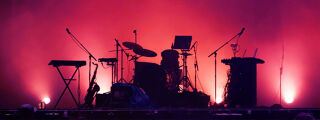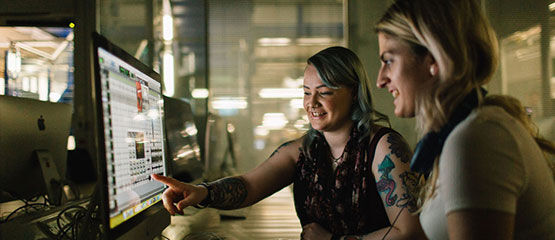Birmingham City University hosted a discussion 'Delivering major live events safely in the Covid-age', in which a panel of professionals from the global live music and events industries explored how the pandemic has posed challenges and created opportunities for the sector.
The music and events industries have been some of the worst affected by the pandemic. Despite this, many professionals have been able to continue to work in new ways, which are likely to continue beyond 2020. Panellists at the discussion included John Adkins (CEO, World Class Events, JA Productions Ltd) as well as three BSc (Hons) Music Technology graduates: James Thurlow (Operations Manager, White Light); Jake Gardner (freelance sound engineer); Minos Koutedakis (freelance audio engineer, Greek National Opera).
Our speakers were each responsible for the technical delivery of major events in 2020 including Dubai’s New Year’s Eve celebrations, Download and Latitude festivals and events for the Royal Philharmonic Concert Orchestra and Greek National Opera. We’ve summarised some of the key takeaways from their discussion.
The virtual revolution
The industry has seen a significant increase in the delivery of high quality digital and virtual events, streamed online for audiences to view from anywhere in the world. Music Technology graduate, Minos, audio engineered for the Greek National Opera, who delivered a series of innovative digital festivals using a mix of pre-recorded content and live streamed shows to continue to showcase the opera for public view. This meant that rather than being limited to the theatre capacity of 1200 people, productions could be recorded in stunning locations such as the Temple of Poseidon and streamed online, receiving as many as 360,000 views globally.
Understanding audiences
Through the inevitable rise of virtual streaming, the music industry will be able to use this as an opportunity to capture data on users and better understand their behaviours and tastes. Streaming providers will be able to track who’s watching, when and how engaged they are. They will also be able to optimise future events and make recommendations to viewers based on their interests, delivering a better experience for music lovers.
Teleportation
Music Technology graduate, James Thurlow (Operations Manager, White Light) sees 'teleportation' as the future of many corporate events.The technology concerning teleportation is developing rapidly and is likely to result in less international travel for corporate events. The Smartstage product, developed by White Light, uses immersive video technology to create the illusion that conference delegates and presenters are situated anywhere in the world. Presenters can be projected into spaces, and even next to colleagues who are in entirely different places, yet appear to be in the same place.
Helping the planet
A further benefit of the rise in virtual conferencing and teleportation, is that there may no longer be a demand for big corporations to fly executives around the world for business meetings. The panellists predict that this will be seen as an excellent opportunity for businesses to take one step closer to their goals to become carbon neutral, by reducing air travel.
Building resilience and innovation
Music is a constantly evolving industry and the pandemic has further enhanced the skills of technical music professionals to push boundaries and innovate. Panellists noted how the constant need for professionals in live music and events to adapt and react to changing policy throughout 2020, has resulted in a much more adaptable industry which will be better equipped to deal with crises in the future.
Ready for the Rock n Roll boom
Music Technology graduate, Jake Gardner, works as a Freelance Sound Engineer at gigs and festivals. He is predicting a ‘Rock n Roll boom’ after the pandemic, when millions of fans, deprived of festivals and gigs for too long, will be itching to get back to live events. Jake has been busy with virtual studio work which continued through the pandemic. While he can’t predict when we’ll see the return of live events, he is certain people are still passionate about live music and will return to events as soon as they are announced.
The 'new norm'
Despite the challenges posed by the virus, the discussion demonstrated that with increased planning and guidance, some events could be safely delivered, giving an insight into how events may look in the future. Increased sanitising of spaces and equipment, thermal guns, reduced and controlled capacity, one way systems and regular testing are just some of the measures which are likely to be become the ‘new norm’ of live events.






